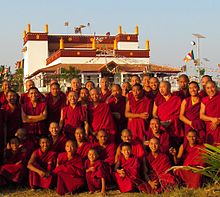
Back Sangha Afrikaans سانغا Arabic Сангха Byelorussian Сангга BE-X-OLD Сангха Bulgarian সংঘ Bengali/Bangla དགེ་འདུན་དཀོན་མཆོག Tibetan Sangha Catalan سانگا CKB Sangha (buddhismus) Czech
| Translations of Saṃgha | |
|---|---|
| Sanskrit | संघ (IAST: saṃgha) |
| Pali | saṅgha (Dev: सङ्घ) |
| Bengali | সঙ্ঘ |
| Burmese | သံဃာ (MLCTS: θàɰ̃ɡà) |
| Chinese | 僧伽 (Pinyin: sēngjiā[1]) |
| Japanese | 僧 (Rōmaji: sō) |
| Khmer | សង្ឃ (UNGEGN: sângkh; ALA-LC: sanggh) |
| Korean | 승가 僧伽 (RR: seungga) |
| Sinhala | සංඝයා |
| Tibetan | དགེ་འདུན་ (dge 'dun[2]) |
| Tamil | சங்கம் |
| Tagalog | Sangha ᜐᜅ̟ᜑ |
| Thai | (พระ)สงฆ์ (RTGS: (phra)song) |
| Vietnamese | Tăng đoàn Tăng già 僧團 僧伽 |
| Glossary of Buddhism | |

| Part of a series on |
| Buddhism |
|---|
 |
Sangha (IPA: [sɐnɡʱɐ]) is a Pali[3][4][5] word used in many Indian languages, including Sanskrit[6] which means "association", "assembly", "company" or "community"; in these languages, sangha is frequently used as a surname. In a political context, it was historically used to denote a governing assembly in a republic or a kingdom, and for a long time, it has been used by religious associations, including Buddhists, Jains and Sikhs. Given this history, some Buddhists have stated that the tradition of the sangha represents humanity's oldest surviving democratic institution.[7]
In Buddhism, sangha refers to the monastic communities of bhikkhu (monks) and bhikkhuni (nuns). These communities are traditionally referred to as the bhikkhu-sangha or the bhikkhuni-sangha. As a separate category, those Buddhists who have attained any of the four stages of enlightenment, whether or not they are members of the monastic community, are referred to as the āryasaṅgha ("noble Sangha").[8][9]
According to the Theravada school and Nichiren Shoshu Buddhism, the term sangha does not refer to the community of unenlightened sāvakas (lay followers) nor does it refer to the community of Buddhists as a whole. The Theravada school uses the term parisā ("assembly") or catuparisā ("fourfold assembly") to refer to the bhikkhu, bhikkhunī, upāsaka, and upāsikā.[10][11][9]
- ^ "zdic.net: 僧伽". Archived from the original on 4 October 2013. Retrieved 1 October 2013.
- ^ Buswell, Robert Jr.; Lopez, Donald S. Jr., eds. (2013). Princeton Dictionary of Buddhism. Princeton, NJ: Princeton University Press. ISBN 9780691157863.
- ^ "sangha". Lexico UK English Dictionary. Oxford University Press. Archived from the original on 5 July 2020.
- ^ "sangha". American Heritage Dictionary of the English Language. Houghton Mifflin Harcourt. Archived from the original on 18 July 2020. Retrieved 6 May 2020.
- ^ "sangha". Collins English Dictionary. HarperCollins. Archived from the original on 18 July 2020. Retrieved 6 May 2020.
- ^ "Definitions for sangha". Suttacentral. Archived from the original on 4 July 2020. Retrieved 4 July 2020.
- ^ Brahm, Ajahn (14 December 2017). "Why the Buddhist Sangha is the World's Oldest Democracy". YouTube. Archived from the original on 4 February 2020. Retrieved 27 March 2022.
- ^ "What is the Triple Gem?". www.accesstoinsight.org. Archived from the original on 30 July 2016. Retrieved 21 July 2014.
- ^ a b Sangha Archived 14 February 2015 at the Wayback Machine. 2005–2012.
- ^ Bhikkhu Bodhi (November 2010). "Sangha". Archived from the original on 23 September 2015. Retrieved 5 May 2012.
- ^ Bhikkhu Bodhi. "Sangha – Bhikkhu – Gautama Buddha". Scribd. Archived from the original on 9 May 2016. Retrieved 11 September 2017.